14 Jan 2015 | France, News and features, United Kingdom

When drawings being scribbled,
colours dripping red,
words being silenced,
thoughts being limited,
lives turn to nothing,
can you touch pain with politics?
Can you perceive pain with your beliefs?
Lives smeared with blood,
your loved ones lying on the ground
lifeless…
Can you hold on to reason,
and when fear like dark clouds
leaks within everyone,
and when fear feeds more fears
and when fear swells hatred
with its giant steps,
can you cure desperation with laws?
When walls are being built again
for the sake of freedom and security,
with violence and blood,
can you create peace with concepts,
when a person without blinking an eye
can kill another person,
when another can glorify death
for the sake of religion?
The moment you declare
you believe,
if the world stops turning,
if reasoning,
sensibility,
sensitivity,
goes blind against beliefs
and even a pen could be perceived as a weapon,
how can thoughts be free?
What would expressing yourself mean?
This poem was posted on 14 January 2015 at indexoncensorship.org
13 Jan 2015 | News and features, United Kingdom
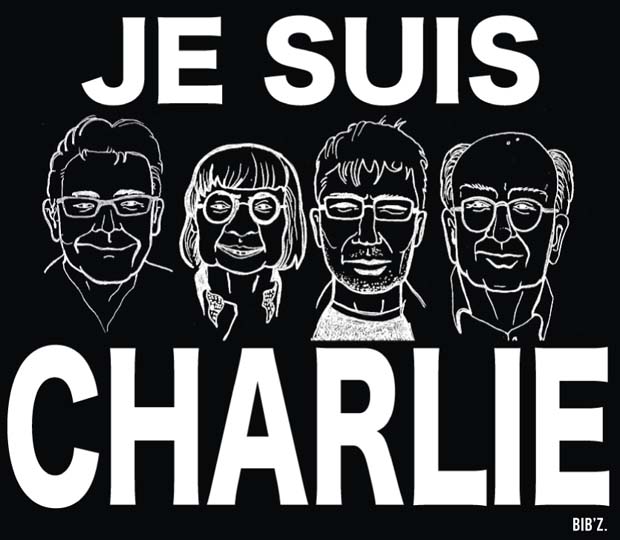
Nadhim Zahawi is a member of the BIS Select Committee, the Party’s Policy Board and MP for Stratford on Avon. This article is from Conservative Home
You can’t kill an idea by killing people. The sickening attack on Charlie Hebdo has shown that to be true. As France mourns her dead, millions around the world are discovering the work of her bravest satirists. Nous sommes Charlie.
Unfortunately, the same is true of the terrorists. Bin Laden may be at the bottom of the sea, but his poisonous ideology lives on. As long as it inspires deluded young men to kill, these attacks will keep happening. We can’t win this fight unless we also win the battle of ideas.
This is an urgent task. Thousands of EU citizens have travelled to the Middle East to serve under ISIS’s black banner. Many will return with combat experience and carrying the virus of radicalism. Some will be eager to put their new terrorist skills to work. It’s vital that we stop them.
Our security services have an important role to play, but research suggests that the most effective way of tackling terrorism is “changing the narrative”. That means challenging the stories used by extremists to justify their twisted worldview.
First and foremost, this means rejecting the idea that this this is a clash of civilizations: Islam versus the West. The reality is that jihadists have claimed more lives in the Islamic world than anywhere else. In December last year, the Pakistani Taliban gunned down 132 schoolchildren in their classrooms. On the same day as the attack in Paris, a car bomb exploded in Yemen killing at least 38 people. Muslim-majority countries, as much as the West, have a clear interest in stamping out this ideology.
It’s time the Islamic world took a leadership position on this issue. When the news from Paris broke, countries such as Saudi Arabia, Pakistan and Afghanistan were quick to condemn the attacks. Yet all three have legal systems carrying the death penalty for blasphemy. In virtually every Muslim-majority country, publishing a magazine like Charlie Hebdo would earn you a fine or imprisonment.
These laws support the idea that religious offence is a crime to be punished rather than a price we must pay for freedom of expression. They also fuel extremist violence. In Pakistan, blasphemy charges are often levied at religious minorities on the flimsiest of pretexts. Those accused are sometimes lynched by vigilante mobs while awaiting trial. Politicians who’ve dared to speak out against the laws have been assassinated.
One of the best tributes we could pay to the brave men and women of Charlie Hebdo would be to use our diplomatic influence to get some of these laws repealed. Change won’t happen overnight, and we will have to be patient with these countries. After all, the last successful prosecution for blasphemy in Britain was as recent as 1977, and the laws only came off the statute books in 2008.
I am not arguing that we should preach to Islamic governments; but nor should we turn a blind eye to this issue. Reforming attitudes to blasphemy would send a powerful message to extremists: freedom of speech isn’t just a Western value – it’s our common birthright as human beings.
And we shouldn’t be frightened of having a conversation about religion here at home. Talking about religion doesn’t come naturally. As a culture, we ‘don’t do God’. Yet it’s vital that mainstream Muslims feel comfortable discussing their faith in public. They, not the Government, are best placed to take on the dodgy imams and self-appointed sheikhs in open debate.
The Qur’an is clear that it’s the role of Allah, not man to judge unbelievers. In the 7th Century, Ali bin Abi Talib, the cousin of the Prophet and a leader of the original Islamic Caliphate, said: “Whoever does not accept others’ opinions will perish”. There’s a sound Islamic case for freedom of expression, and it needs a good airing.
Last, we have to practice what we preach. If we want Muslims to come out and say “not in my name” every time there’s a terrorist atrocity we too need to be vocal in our condemnation of attacks on Muslims and mosques in the West.
Charlie Hebdo was a target because humour is dangerous. You can’t be the all-powerful Islamic Caliphate and be the butt of someone else’s joke. The goal of terrorism is to frighten us – so laughter is one of our most powerful weapons.
This article was originally posted at Conservative Home on January 12, 2015. It is reposted here with permission.
8 Jan 2015 | Europe and Central Asia, France, News and features, Statements
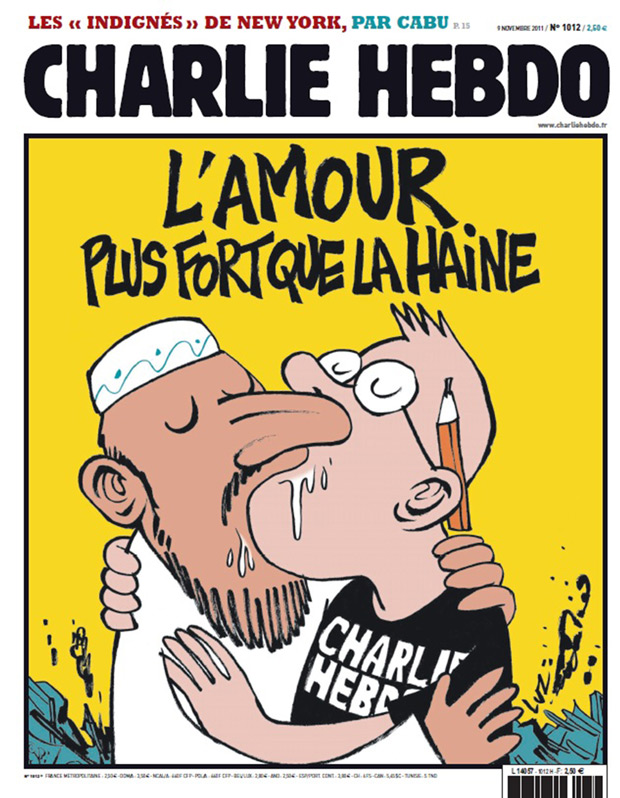
Today we are publishing work from the satirical magazine Charlie Hebdo as part of a global action in a signal of solidarity with the French publication, which came under such deadly attack yesterday.
The joint action also underlines the commitment of authors and journalists around the world to state their commitment to freedom of expression and its vital importance. We stand together for the right to mock, to caricature, to argue, debate and offend.
We believe that only through solidarity – in showing that we truly defend all those who exercise their right to speak freely – can we defeat those who would use violence to silence free speech.
We have selected 12 cartoons from Charlie Hebdo that reflect the broad sweep of its satire, which ranges from politics, to immigration, to religion*. As part of the joint action, publications are selecting a cartoon, a range of cartoons, or covers that they believe best reflect the work of Charlie Hebdo. The idea is a moment of unity in which we show that together we stand up for journalism and the right to free speech, no matter what, and to show our support and respect for those killed on January 7.
Many organisations and individuals have already posted a number of the Charlie Hebdo cartoons, including Berliner Zeitung, Buzzfeed, The Daily Beast, Fox News, and The Times of London. Some reflect the wide variety of satirical content of Charlie Hebdo, others focus only on those related to Islam. Our own aim is to show that fear should not be allowed to stifle free expression, and to reflect the full range of Charlie Hebdo’s work.
“The ability to express ourselves freely is fundamental to a free society,” said Jodie Ginsberg, CEO of Index on Censorship. “This includes the freedom to publish, to satirise, to joke, to criticise, even when that might cause offence to others. Those who wish to silence free speech must never be allowed to prevail.”
You can see the joint statement on the action here.
Over the past decade it has often been left to small individual publications to take a strong stand on freedom of expression incursions. This global action is a way of showing it is not just one publication or author that stands alone.
For those over the years who say they support freedom of expression but with opt outs, or who have argued that freedom of expression doesn’t extend to articles, photographs or cartoons which offend them, it should be made clear that freedom of expression gives everyone the chance to debate opinions, and that right is vital.
If we stopped writing or broadcasting about every issue that someone found offensive then the newspapers and television news would be empty of subjects. We would know nothing, and we would have no way of knowing what others thought. As John Stuart Mill wrote in On Liberty: “If all mankind minus one, were of one opinion, and only one person were of the contrary opinion, mankind would be no more justified in silencing that one person, than he, if he had the power, would be justified in silencing mankind.” Let our response to the attack on Charlie Hebdo not be silence.
*It is worth noting that in 2014, of 52 front covers, 39 had a focus on politics (31 on French politics, six on international politics and two on gender politics; of these four had a sub-focus on religion – e.g. focus on Marine le Pen and mention antisemitism); eight had a focus on religion (specifically, nos: 1130, 1142, 1143, 1147, 1162, 1163, 1166, 1173) and five had a focus on current events (e.g. flight MH370, Ebola)
Some of the publications and organisations joining us at this hour include:
The Guardian
New Statesman
Mail and Guardian
Folha de San Paulo
City Press
Comic Book Legal Defense Fund
Pen America
Article 19
English Pen
Reporters Without Borders
Conway Hall
Atheist NI
The Art Newspaper
New Humanist
Stephen Fry
Los Angeles Times
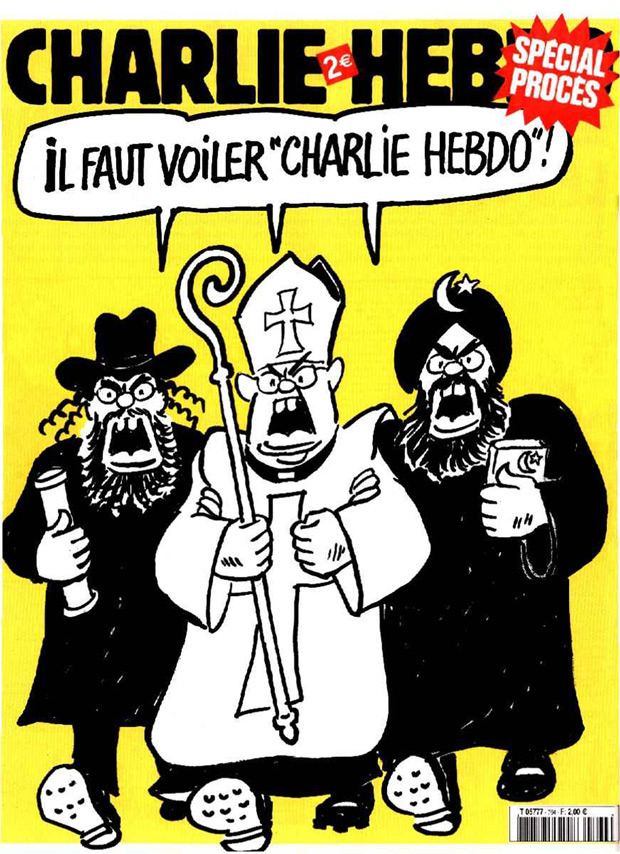
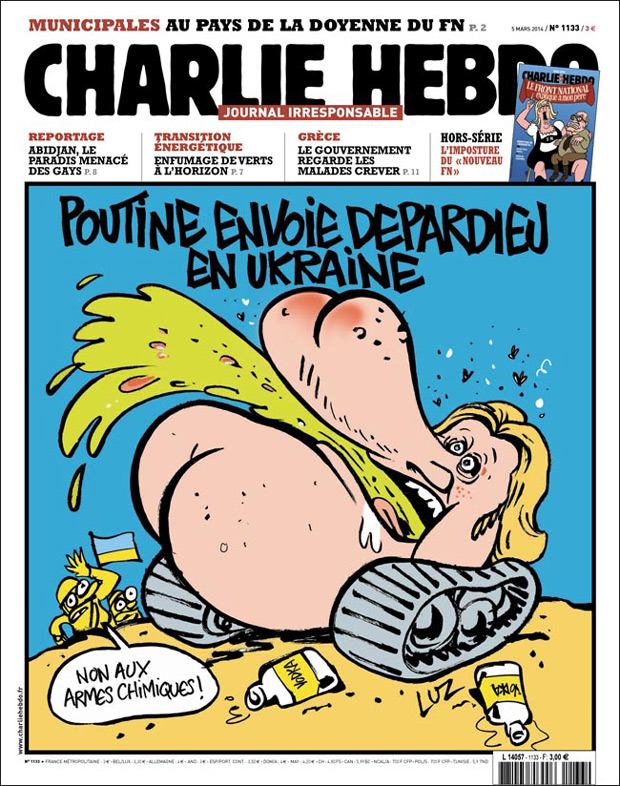
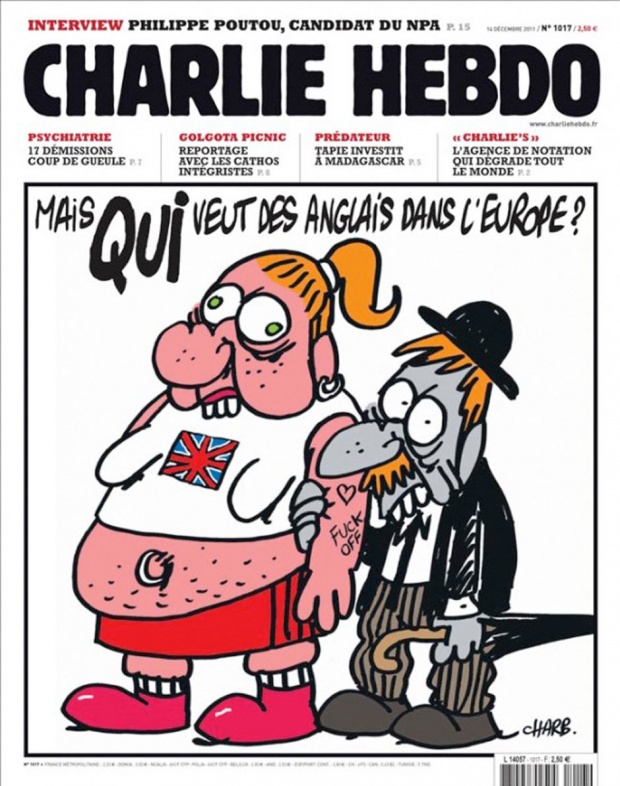
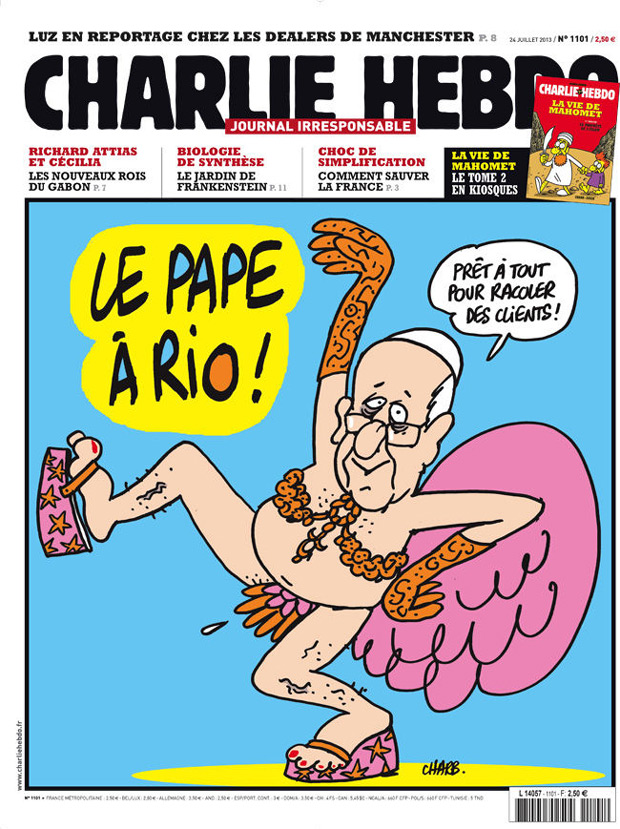
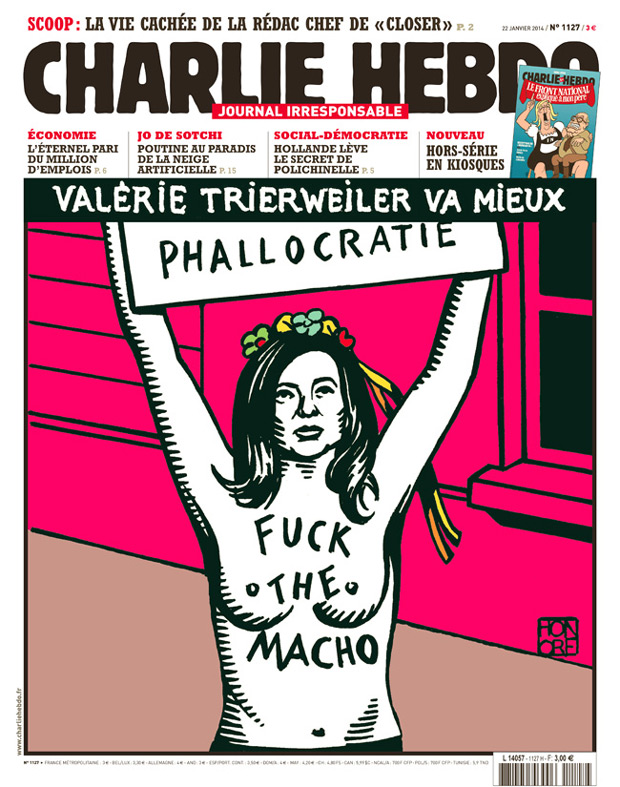

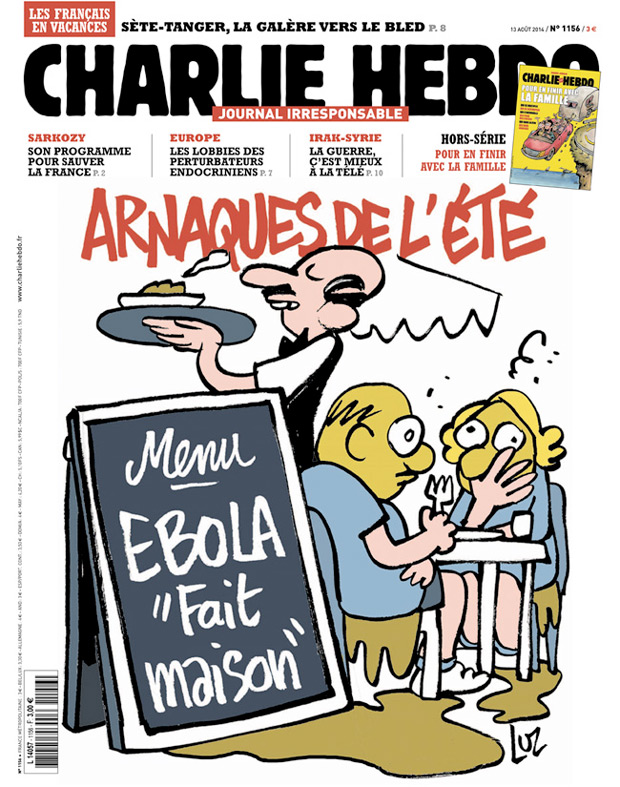
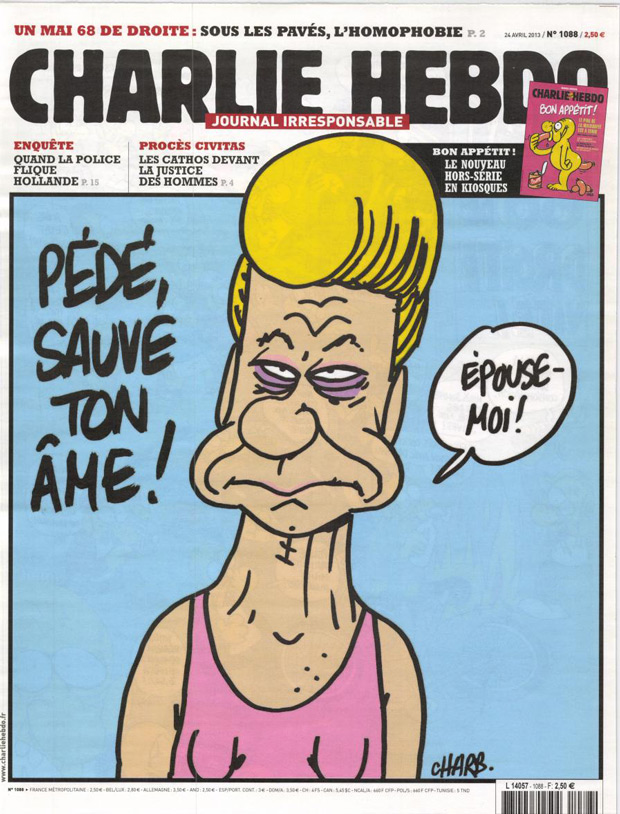
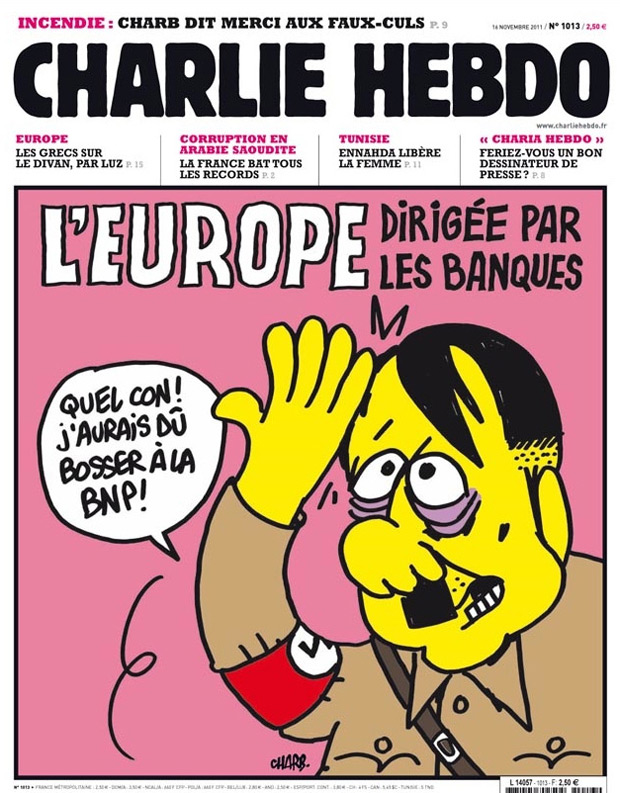
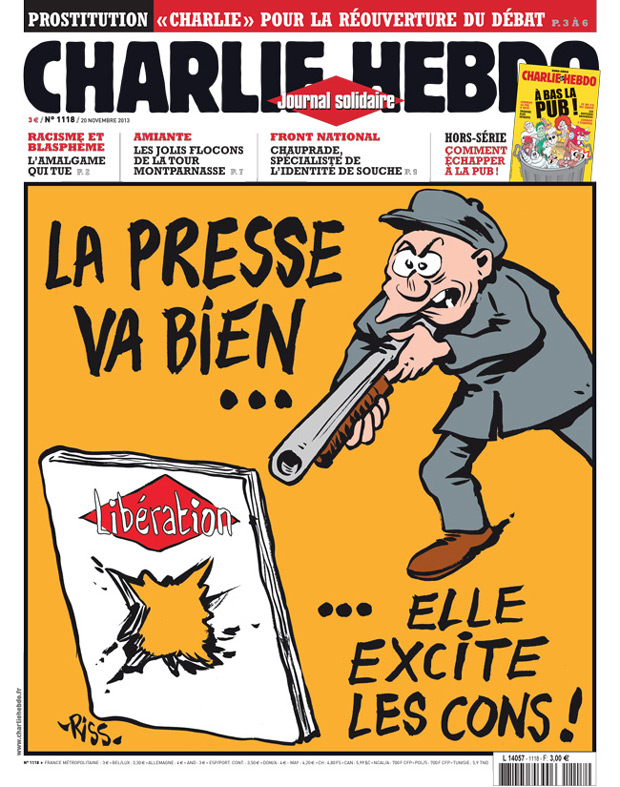
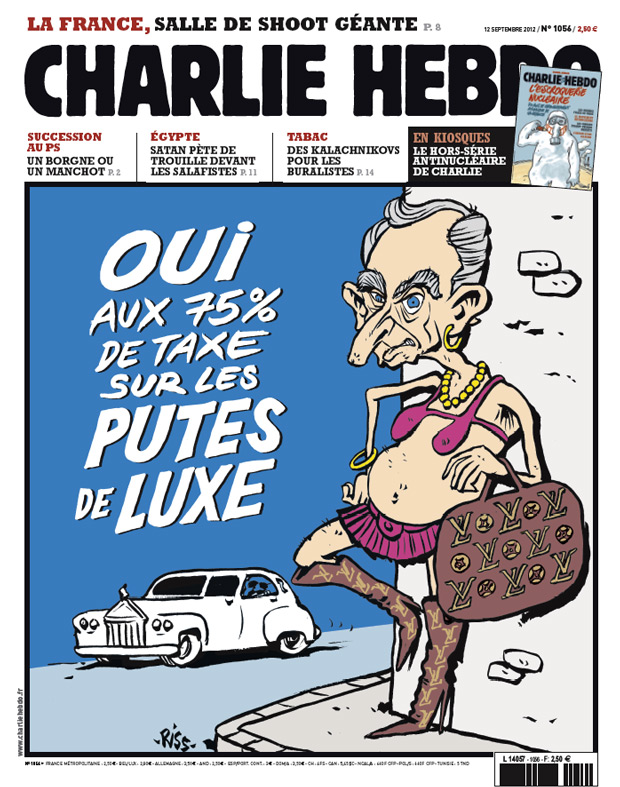
7 Jan 2015 | Europe and Central Asia, France, News and features, Statements
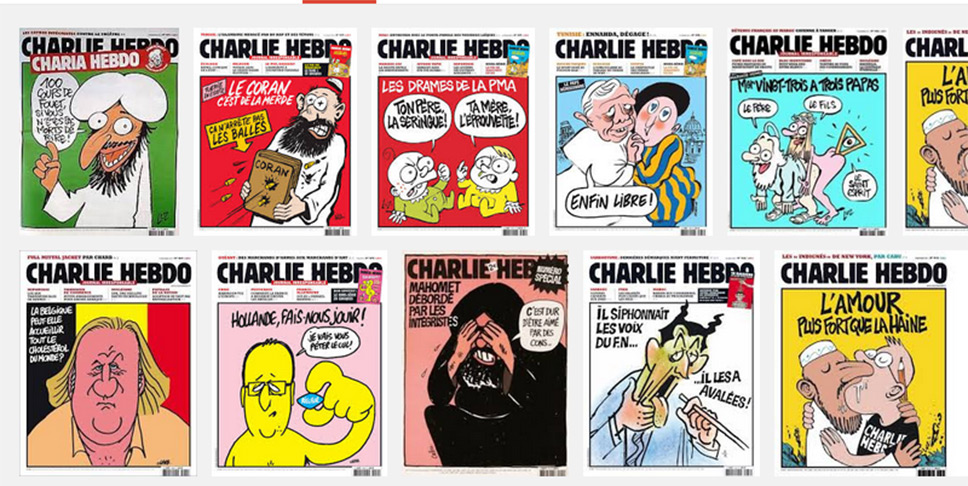
Index on Censorship condemns this appalling attack on the satirical magazine Charlie Hebdo, and any attempt to silence a free press. Nothing can justify such an attack.
Index CEO Jodie Ginsberg said: “The ability to express ourselves freely is fundamental to a free society. This includes the freedom to publish, to satirise, to joke, to criticise, even when that might cause offence to others. Those who wish to silence free speech must never be allowed to prevail.”
Our thoughts and solidarity are with the staff and families of Charlie Hebdo.
As James Kirchick wrote for Index after the magazine was firebombed in 2011: We are united in a fundamental belief: that freedom of expression is irrevocable and fundamental to a free society.
—
La liberté d’expression est non négociable
Index on Censorship condamne l’horrible attaque dans les locaux de l’hebdomadaire Charlie Hebdo et toute tentative de réduire au silence la presse libre. Rien ne peut justifier une telle attaque.
“La capacité à nous exprimer librement est fondamentale pour une société libre. Cela inclut la liberté à la satire, à la blague, à la critique, même si cela pourrait offenser d’autres personnes. Ceux qui veulent faire taire la liberté d’expression ne doivent jamais l’emporter,” Jodie Ginsberg, directrice générale de Index on Censorship.
Nous exprimons notre solidarité et toutes nos pensées sont avec le personnel de Charlie Hebdo et leurs proches.
Comme l’avait écrit James Kirchick lorsque que l’hebdomadaire fut incendié en 2011: Nous somme unis par une conviction fondamentale: la liberté d’expression est irrévocable et fondamentale pour toute société libre.















